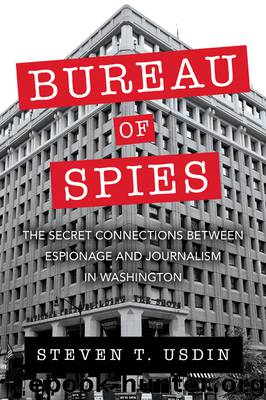Bureau of Spies by Steven T. Usdin

Author:Steven T. Usdin [Steven T. Usdin]
Language: eng
Format: epub
ISBN: 9781633884779
Publisher: Prometheus Books
I love your memorandum of July thirtieth in regard to the multi-adjectived anthropologist. I think you are completely right. I know that you and Henry Field can carry out this project unofficially, exploratorially, ethnologically, racially, admixturally, miscegenationally, confidentially and, above all, budgetarily.
Any person connected herewith whose name appears in the public print will suffer guillotinally.44
Roosevelt was expressing satisfaction with Carter's report on his visit with Aleš Hrdlička, curator of physical anthropology at the Smithsonian Museum of Natural History. Roosevelt had carried on a lively correspondence with Hrdlička for over a decade and had absorbed the scientist's theories about racial mixtures and eugenics. Roosevelt, the scion of two families that considered themselves American aristocrats, was especially attracted to Hrdlička's notions of human racial “stock.”
A prominent public intellectual who had dominated American physical anthropology for decades, Hrdlička was convinced of the superiority of the white race and obsessed with racial identity. Shortly after the Pearl Harbor attack he'd written to Roosevelt expressing the view that the “less developed skulls” of Japanese were proof that they were innately warlike and had a lower level of evolutionary development than other races. The president wrote back asking whether the “Japanese problem” could be solved through mass interbreeding.45
Roosevelt had asked Carter to recruit Hrdlička to head up a secret international committee of anthropologists that would study the “ethnological problems anticipated in post-war population movements.” Carter's report on the meeting, which prompted Roosevelt's effusive memo, called Hrdlička a “stubborn, erudite, arrogant, charming, authoritarian, friendly, difficult, delightful old gentleman.”46
Outlining the president's charge for the committee, Carter told Hrdlička it was expected to “formulate agreed opinions as to problems arising out of racial admixtures and to consider the scientific principles involved in the process of miscegenation as contrasted with the opposing policies of so-called ‘racialism.’” The instructions were consistent with views Roosevelt had expressed for decades.47
In 1925, while undergoing therapy for polio at Warm Springs, Georgia, FDR wrote a series of columns for the Macon Telegraph, including one that touched on his ideas about immigration. He praised elements of Canada's immigration policy, especially its regulations “to prevent large groups of foreign born from congregating in any one locality.” He added, “If, twenty-five years ago, the United States had adopted a policy of this kind we would not have the huge foreign sections which exist in so many of our cities.” The future president remarked that “no sensible American wants this country to be made a dumping ground for foreigners of any nation, but it is equally true that there are a great many foreigners who, if they came here, would make exceedingly desirable citizens. It becomes, therefore, in the first place, a question of selection.” Roosevelt informed his readers that “a little new European blood of the right sort does a lot of good in every community.”
While the column doesn't define “the right sort,” it provides two examples of good emigrants, those from Southern Germany and Northern Italy. Roosevelt also expressed the opinion that “for a good many years
Download
This site does not store any files on its server. We only index and link to content provided by other sites. Please contact the content providers to delete copyright contents if any and email us, we'll remove relevant links or contents immediately.
| Espionage | Hoaxes & Deceptions |
| Murder & Mayhem | Organized Crime |
| Serial Killers | White Collar Crime |
Mindhunter: Inside the FBI's Elite Serial Crime Unit by John E. Douglas & Mark Olshaker(9313)
Wiseguy by Nicholas Pileggi(5767)
Room 212 by Kate Stewart(5102)
Hitman by Howie Carr(5086)
Secrecy World by Jake Bernstein(4739)
Killers of the Flower Moon: The Osage Murders and the Birth of the FBI by David Grann(4435)
Papillon (English) by Henri Charrière(4255)
Breaking Free by Rachel Jeffs(4215)
Killers of the Flower Moon by David Grann(4036)
Say Nothing by Patrick Radden Keefe(3974)
American Kingpin by Nick Bilton(3872)
The Secret Barrister by The Secret Barrister(3691)
Molly's Game: From Hollywood's Elite to Wall Street's Billionaire Boys Club, My High-Stakes Adventure in the World of Underground Poker by Molly Bloom(3528)
Mysteries by Colin Wilson(3444)
In Cold Blood by Truman Capote(3374)
Signature in the Cell: DNA and the Evidence for Intelligent Design by Stephen C. Meyer(3125)
I'll Be Gone in the Dark by Michelle McNamara(3071)
Rogue Trader by Leeson Nick(3039)
Bunk by Kevin Young(2992)
